Let's say I have this two matrices:
double[][] a = new double[2][2]
a[0][0] = 1
a[0][1] = 2
a[1][0] = 3
a[1][1] = 4
double[][] b = new double[2][2]
b[0][0] = 1
b[0][1] = 2
b[1][0] = 3
b[1][1] = 4
in the traditional way, to sum this matrices I would do a nested for loop:
int rows = a.length;
int cols = a[0].length;
double[][] res = new double[rows][cols];
for(int i = 0; i < rows; i++){
for(int j = 0; j < cols; j++){
res[i][j] = a[i][j] + b[i][j];
}
}
I'm fairly new to the stream API but I think this is a great fit to use with parallelStream so my question is if there's a way to do this and take advantage of parallel processing?
Edit: not sure if this is the right place but here we go: Using some suggestions I putted the Stream to the test. The set up was like this: Classical approach:
public class ClassicMatrix {
private final double[][] components;
private final int cols;
private final int rows;
public ClassicMatrix(final double[][] components){
this.components = components;
this.rows = components.length;
this.cols = components[0].length;
}
public ClassicMatrix addComponents(final ClassicMatrix a) {
final double[][] res = new double[rows][cols];
for (int i = 0; i < rows; i++) {
for (int j = 0; j < rows; j++) {
res[i][j] = components[i][j] + a.components[i][j];
}
}
return new ClassicMatrix(res);
}
}
Using @dkatzel suggestion:
public class MatrixStream1 {
private final double[][] components;
private final int cols;
private final int rows;
public MatrixStream1(final double[][] components){
this.components = components;
this.rows = components.length;
this.cols = components[0].length;
}
public MatrixStream1 addComponents(final MatrixStream1 a) {
final double[][] res = new double[rows][cols];
IntStream.range(0, rows*cols).parallel().forEach(i -> {
int x = i/rows;
int y = i%rows;
res[x][y] = components[x][y] + a.components[x][y];
});
return new MatrixStream1(res);
}
}
Using @Eugene suggestion:
public class MatrixStream2 {
private final double[][] components;
private final int cols;
private final int rows;
public MatrixStream2(final double[][] components) {
this.components = components;
this.rows = components.length;
this.cols = components[0].length;
}
public MatrixStream2 addComponents(final MatrixStream2 a) {
final double[][] res = new double[rows][cols];
IntStream.range(0, rows)
.forEach(i -> Arrays.parallelSetAll(res[i], j -> components[i][j] * a.components[i][j]));
return new MatrixStream2(res);
}
}
and a test class, running 3 independent times one for each method (just replacing the method name in main()):
public class MatrixTest {
private final static String path = "/media/manuel/workspace/data/";
public static void main(String[] args) {
final List<Double[]> lst = new ArrayList<>();
for (int i = 100; i < 8000; i = i + 400) {
final Double[] d = testClassic(i);
System.out.println(d[0] + " : " + d[1]);
lst.add(d);
}
IOUtils.saveToFile(path + "classic.csv", lst);
}
public static Double[] testClassic(final int i) {
final ClassicMatrix a = new ClassicMatrix(rand(i));
final ClassicMatrix b = new ClassicMatrix(rand(i));
final long start = System.currentTimeMillis();
final ClassicMatrix mul = a.addComponents(b);
final long now = System.currentTimeMillis();
final double elapsed = (now - start);
return new Double[] { (double) i, elapsed };
}
public static Double[] testStream1(final int i) {
final MatrixStream1 a = new MatrixStream1(rand(i));
final MatrixStream1 b = new MatrixStream1(rand(i));
final long start = System.currentTimeMillis();
final MatrixStream1 mul = a.addComponents(b);
final long now = System.currentTimeMillis();
final double elapsed = (now - start);
return new Double[] { (double) i, elapsed };
}
public static Double[] testStream2(final int i) {
final MatrixStream2 a = new MatrixStream2(rand(i));
final MatrixStream2 b = new MatrixStream2(rand(i));
final long start = System.currentTimeMillis();
final MatrixStream2 mul = a.addComponents(b);
final long now = System.currentTimeMillis();
final double elapsed = (now - start);
return new Double[] { (double) i, elapsed };
}
private static double[][] rand(final int size) {
final double[][] rnd = new double[size][size];
for (int i = 0; i < size; i++) {
for (int j = 0; j < size; j++) {
rnd[i][j] = Math.random();
}
}
return rnd;
}
}
The results:
Classic Matrix size, Time (ms)
100.0,1.0
500.0,5.0
900.0,5.0
1300.0,43.0
1700.0,94.0
2100.0,26.0
2500.0,33.0
2900.0,46.0
3300.0,265.0
3700.0,71.0
4100.0,87.0
4500.0,380.0
4900.0,432.0
5300.0,215.0
5700.0,238.0
6100.0,577.0
6500.0,677.0
6900.0,609.0
7300.0,584.0
7700.0,592.0
Stream1, Time(ms)
100.0,86.0
500.0,13.0
900.0,9.0
1300.0,47.0
1700.0,92.0
2100.0,29.0
2500.0,33.0
2900.0,46.0
3300.0,253.0
3700.0,71.0
4100.0,90.0
4500.0,352.0
4900.0,373.0
5300.0,497.0
5700.0,485.0
6100.0,579.0
6500.0,711.0
6900.0,800.0
7300.0,780.0
7700.0,902.0
Stream2, Time(ms)
100.0,111.0
500.0,42.0
900.0,12.0
1300.0,54.0
1700.0,97.0
2100.0,110.0
2500.0,177.0
2900.0,71.0
3300.0,250.0
3700.0,106.0
4100.0,359.0
4500.0,143.0
4900.0,233.0
5300.0,261.0
5700.0,289.0
6100.0,406.0
6500.0,814.0
6900.0,830.0
7300.0,828.0
7700.0,911.0
I made a plot for better comparison:

There's no improvement at all. Where's the flaw? Are the matrices to small (7700 x 7700)? Greater than this it blows up my computer memory.